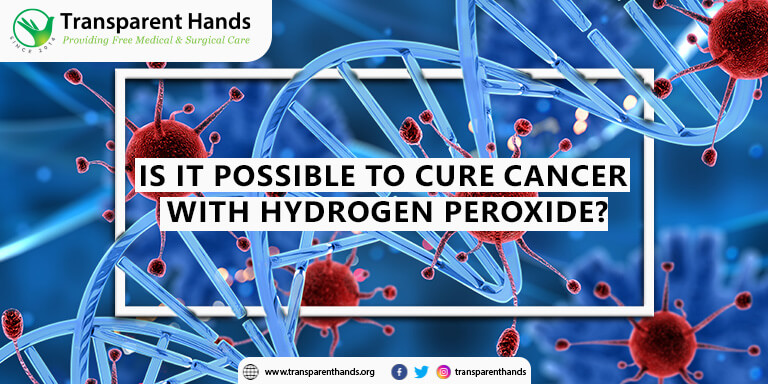Is it Possible to Cure Cancer with Hydrogen Peroxide?

A chemical made of hydrogen and oxygen is called hydrogen peroxide (H2O2). It is a light blue liquid that resembles water but smells very differently. Because hydrogen peroxide is an effective oxidizer, it readily releases oxygen when it comes into contact with other substances.
Some people even claim that it can cure cancer. An old theory says that low levels of oxygen can cause cancer. Hydrogen peroxide is an oxygenating compound, which means it is a chemical that contains oxygen. People who think hydrogen peroxide can be used to treat cancer say that it does so by flooding cancer cells with oxygen.
Discovery of Hydrogen Peroxide
The French chemist Louis Jacques Thénard made the initial discovery of hydrogen peroxide in 1818. Since then, it has been used for a number of purposes in various industries, such as disinfectant, bleach, and rocket propellant. In medicine, hydrogen peroxide has been used as a mouthwash to treat specific oral conditions as well as an antiseptic for small cuts and wounds.
Uses of Hydrogen Peroxide
Hydrogen peroxide’s primary applications in healthcare are as an antiseptic and disinfectant. It can be applied to clean wounds, stop infection, and speed up healing. However, hydrogen peroxide should only be used under medical supervision and with extreme caution. Here are some of the ways it is used to treat various illnesses and medical conditions:
Wound Cleaning
Minor wounds and cuts can be disinfected with hydrogen peroxide. Infection can be prevented with its aid in the removal of debris and dead tissue. Excessive use, even when diluted, can slow wound healing, so caution is advised.
Oral Hygiene
Mouthwashes and gargles containing hydrogen peroxide are sometimes recommended for the treatment of gingivitis (gum inflammation) and other mild mouth infections. It can help reduce oral bacteria and relieve symptoms. However, it should not be ingested, and continued use requires dental supervision.
Earwax Removal
A diluted solution of hydrogen peroxide may be used to soften and help remove excessive earwax. However, it is essential to follow proper instructions and consult a healthcare professional before attempting to clean the ears with hydrogen peroxide.
The potential of Hydrogen Peroxide
Hydrogen peroxide, also known as H2O2, has been known for a long time to be a disinfectant and antiseptic. Most people agree that it works well to clean wounds and prevent infections. Because it can get rid of oxygen, hydrogen peroxide can be used for many different things. But it is important to tell the difference between how hydrogen peroxide can be used as an antiseptic and how it might be able to cure cancer on its own.
The Complex Landscape of Cancer
Cancer is a complex disease with many different facets, including uncontrolled cell growth and the risk of metastasis. Different forms of cancer have different origins and symptoms, so tried and tested therapies such as surgery, radiation therapy, chemotherapy, immunotherapy, and targeted therapy are required. These treatments have undergone rigorous regulatory review, clinical trials, and research.
Examining the Research
Although hydrogen peroxide has been the subject of experimental studies investigating cancer treatment, there is currently insufficient scientific proof to support its use as a permanent cancer cure. Claims about hydrogen peroxide’s ability to treat cancer are frequently based on the idea of oxidative therapy, which aims to use reactive oxygen species to kill cancer cells. Such methods have not been widely embraced as standard cancer treatments, and their efficacy and safety are still being researched.
The Significance of Evidence-Based Medicine
Particularly when treating cancer and other potentially fatal diseases, evidence-based medicine is crucial. Scientific research supports the use of surgery, radiation therapy, chemotherapy, immunotherapy, and targeted therapy. It is essential to seek the advice of trained medical professionals who can provide reliable information and direct patients toward the most effective treatments.
Risks Related to the Use of Hydrogen Peroxide to Treat Cancer
Hydrogen peroxide as a treatment for cancer is a controversial and experimental method that most cancer patients do not accept or find helpful. When talking about using hydrogen peroxide to treat cancer, it is important to stress the possible side effects and safety concerns:
Lack of Clinical Evidence
Clinical trials currently underway have not shown hydrogen peroxide to be an effective or safe treatment for cancer. Most research is either preliminary, based on in vitro or animal experiments, or both. Without carefully planned human clinical trials, it is difficult to determine the safety and effectiveness of hydrogen peroxide for treating cancer.
Harm to Healthy Cells
Since hydrogen peroxide produces reactive oxygen species, which are toxic to cells, its use raises safety concerns. When treating cancer, it is important to focus on eliminating malignant cells while minimizing harm to healthy ones. Because it affects both normal and cancerous cells, hydrogen peroxide can be extremely harmful.
Tissue Damage
When hydrogen peroxide is present in high enough amounts, it can damage tissues. This could cause inflammation, pain, and other problems, especially if it is applied or given directly to tumors or other sensitive areas.
Lack of Standardized Protocols
The absence of standardized protocols and guidelines for the use of hydrogen peroxide in cancer treatment raises an additional safety concern. Uncertainty regarding the concentration, dosage, and duration of a course of treatment can produce inconsistent results and increase the likelihood of adverse side effects.
Interference with Conventional Treatments
Conventional cancer treatments, such as chemotherapy and radiation therapy, may be affected by hydrogen peroxide. This may cause unexpected results or reduce the efficacy of currently available treatments.
Conclusion
Cancer patients must always rely on treatments that have been thoroughly tested and proven effective in clinical trials. Any decision to try alternative or experimental therapies, like hydrogen peroxide, should be made with the help of qualified medical professionals and in the context of approved clinical trials.
Must Read










Leave Your Comments